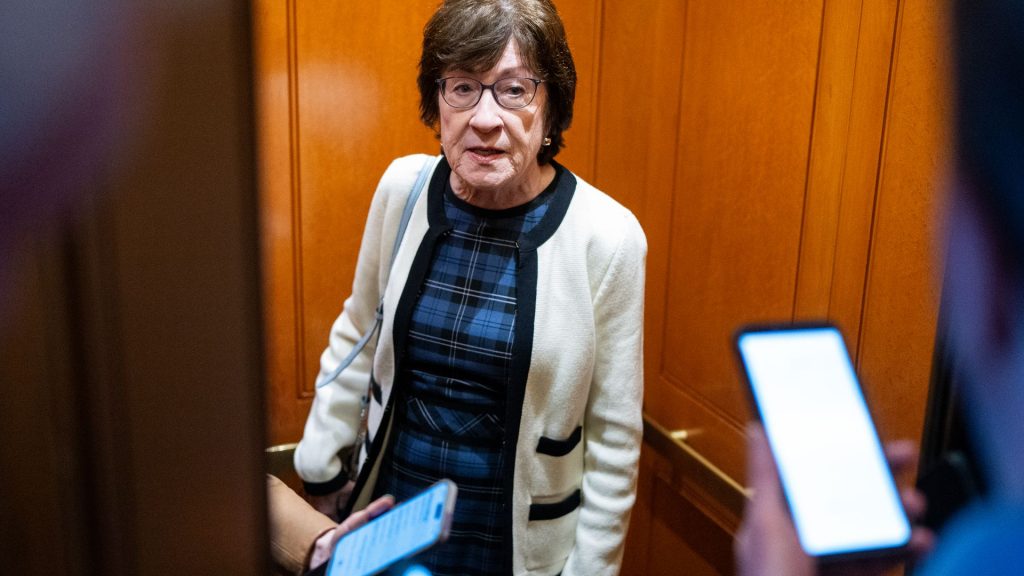GOP appropriations chair has ‘serious objections’ to Trump’s budget proposal

The Republican chairwoman of the Senate Appropriations Committee is unimpressed by President Donald Trump’s recently released 2026 budget proposal and opposes some of it outright. Sen. Susan Collins, R-Maine, made clear that the proposal is simply one step of a larger process and that Congress will have the final say.
“This request has come to Congress late, and key details still remain outstanding,” Collins said in a statement. “Based on my initial review, however, I have serious objections to the proposed freeze in our defense funding given the security challenges we face and to the proposed funding cuts to – and in some cases elimination of – programs like LIHEAP, TRIO, and those that support biomedical research.”
In total, the White House is proposing to cut $163 billion in government programs.
What programs did Collins single out?
The Low Income Home Energy Assistance Program (LIHEAP):
This program gives money to low-income households to help with their heating and cooling costs. It’s a safety net to make sure their heat doesn’t get turned off in the middle of winter or their air conditioning doesn’t get shut off in the heat of summer. The Trump administration wants to end the program by cutting its $4 billion in funding.
Republicans in the Northeast are likely to put up a significant fight against this proposed cut.
When the administration announced cuts to LIHEAP staff in early April, Collins and a bipartisan group of senators spoke out against them.
“Access to affordable home energy is a matter of health and safety for many low-income households, children, and seniors. To that end, we urge you to reverse course on any staffing or funding cuts that would jeopardize the distribution of these funds to our constituents,” Collins and her colleagues said in a statement.
Here’s why the administration said it wants to reduce funding:
“States have policies preventing utility disconnection for low-income households, effectively making LIHEAP a pass-through benefitting utilities in the Northeast. Further, LIHEAP rewards States like New York and California, two of the top recipients for LIHEAP funding, which have implemented anti-consumer policies that drive up home energy prices.”
“The Budget proposes to end this program and to instead support low-income individuals through energy dominance, lower prices, and an America First economic platform.”
What are the TRIO and Gear Up programs?
TRIO and the Gaining Early Awareness and Readiness for Undergraduate Programs help students from low-income families pursue higher education. The programs typically target first-generation college students, those with disabilities and those from diverse backgrounds. The Trump administration is proposing to end the program by cutting its $1.5 billion in funding.
More than 20 years ago, Rep. Tom Cole, R-Okla., who now serves as the House Appropriations Committee Chairman, introduced a bill to increase funding for these programs.
“As a college graduate, a former educator and the parent of a college student, I believe that all students who want the chance to continue their education after high school deserve the chance to accomplish that goal,” Cole said in 2003.
The Trump administration’s explanation:
“TRIO and GEAR UP are a relic of the past when financial incentives were needed to motivate Institutions of Higher Education (IHES) to engage with low-income students and increase access.
“Today, the pendulum has swung and access to college is not the obstacle it was for students of limited means. IHEs should be using their own resources to engage with K-12 schools in their communities to recruit students, and then once those students are on campus, aid in their success through to graduation.”
How much does the Trump administration want to cut from biomedical research?
The Trump administration wants to cut $3.5 billion from the Centers for Disease Control and Prevention and $18 billion from the National Institutes of Health, or about 38% of its $47 billion annual budget. The administration is proposing to consolidate funding for infectious disease and opioids, viral hepatitis, sexually transmitted infectious and tuberculosis programs into one $300 million grant.
The Trump administration wants to cease funding multiple institutes and centers at the NIH, including the National Institute on Minority and Health Disparities and the National Institute of Nursing Research.
The administration said it would give $27 billion to NIH for research.
“These actions put our leadership in biomedical innovation at real risk and must be reversed,” Collins told NBC News.
Collins added that the administration needs a “surgical approach, not a sledgehammer” when it comes to NIH.
The administration’s explanation:
“NIH has broken the trust of the American people with wasteful spending, misleading information, risky research, and the promotion of dangerous ideologies that undermine public health.
“The Budget proposes to reform NIH and focus NIH research activities in line with the President’s commitment to MAHA, including consolidating multiple overlapping and ill-focused programs into five new focus areas with associated spending reforms.
“The Budget refocuses CDC’s mission on core activities such as emerging and infectious disease surveillance, outbreak investigations, and maintaining the Nation’s public health infrastructure, while streamlining programs and eliminating waste.
“The Budget eliminates duplicative, DEI, or simply unnecessary programs.”





